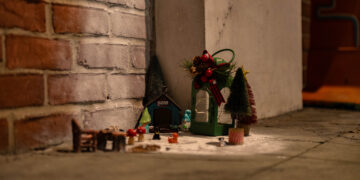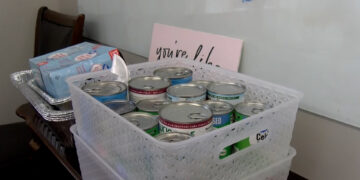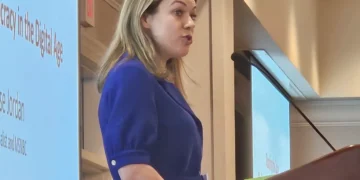
The burned-out, overworked college student’s worst nightmare is all around us. It isn’t monstrously large but rather microscopically imperceptible. This leviathan thrives on unsanitized surfaces, parasitically latches onto hosts and strikes most fervently when it matters most — leading up to exam week.
The classic flu, the dreaded stomach virus, the infamous COVID-19, strep throat, infectious mononucleosis (commonly known as “mono”) and the common cold — are all agents of the same force that derails Friday nights out, conquers lecture halls and disrupts daily life. Yet, despite the risk posed by attending class while sick, most students do it anyway.
If you can’t relate, you’re either lying or you’re The Boy in the Plastic Bubble.
During winter, classrooms become a cacophony of sniffles, coughs and sneezes. Most students attend class regardless because they can’t afford to miss.
In a culture predicated on individualism, we are conditioned to prioritize our own success over the health of our peers. We attend class, even if it means spreading a disruptive airborne contagion.
But is skipping really not an option?
The average flu-like illness costs college students 6 to 24 hours of productivity. The most effective solution isn’t to “tough it out” but to recover quickly. Yet, in the post-COVID-19 era, masks still trigger discomfort and memories of a dark time marked by transmission, quarantine, and isolation. Students wearing masks today face odd stares, ridicule, and alienation.
It’s time to take a page from other cultures. In Japan and many other Asian nations, wearing masks during flu season or even during pollen season is common. We must normalize wearing masks the way we’ve embraced carrying miniature bottles of hand sanitizer.
For sick students: Coming to class only delays your recovery and puts your peers at risk. When in doubt, email your professor. At the very least, wear a mask and carry hand sanitizer — they were lifesavers during the pandemic and can still make a difference.
For professors: Illness impairs students’ performance, slowing progress through the syllabus. Allowing sick students to make up missed work can reduce the spread of illness and improve classroom outcomes.
To tackle the plague of common ailments, we must work together. Professors need to accommodate sick students, students must avoid spreading germs and masks should become a winter staple.
Kadin Collier is a freshman Arabic and international studies double major from Hattiesburg, Miss.





































